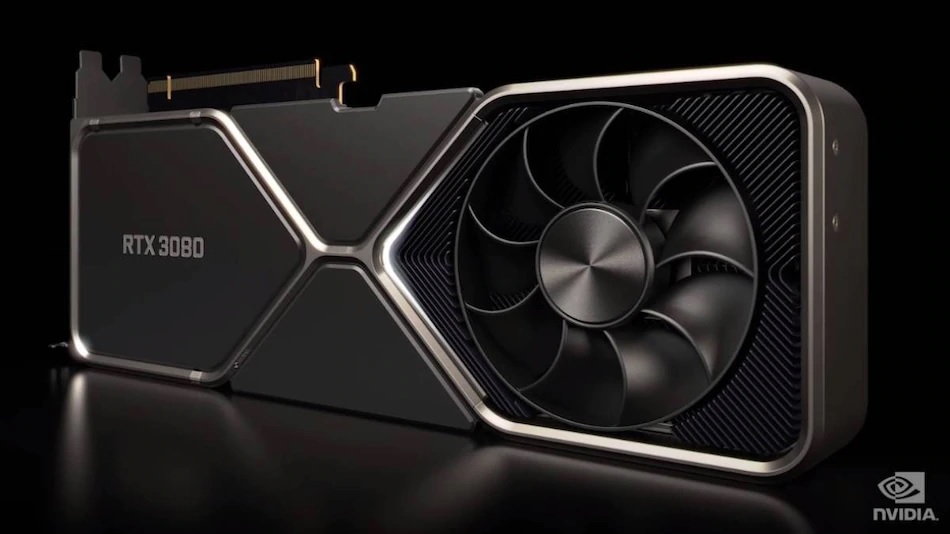Here's why your Nvidia RTX 3080 may be crashing
Nvidia RTX 3080 crashes caused by capacitors, says EVGA

The reason for crashes with some of the Nvidia GeForce RTX 3080 graphics cards appear to be down to problems with capacitors.
Last week it was reported that a suite of RTX 3080 cards, mostly those that come with a factory overclock, were causing crashes to the desktop once the GPU went above 2.0GHz. Now graphics card maker EVGA has come out and declared that the issue is with the type of capacitors it uses on its take on the RTX 3080.
- Nvidia RTX 3080 vs. RTX 2080 Ti: How much better is it?
- Where to buy the Nvidia GeForce RTX 3080 — latest stock updates
- Plus: This PS5 upgrade will give gamers the 'fastest data loading ever'
“During our mass production QC testing we discovered a full 6 POSCAPs solution cannot pass the real world applications testing,” the company said in a blog post. “It took almost a week of R&D effort to find the cause and reduce the POSCAPs to 4 and add 20 MLCC caps prior to shipping production boards, this is why the EVGA GeForce RTX 3080 FTW3 series was delayed at launch. There were no 6 POSCAP production EVGA GeForce RTX 3080 FTW3 boards shipped.
“But, due to the time crunch, some of the reviewers were sent a pre-production version with 6 POSCAP’s, we are working with those reviewers directly to replace their boards with production versions.”
Put into basic English, the cards EVGA was referring to use a different capacitor design to those found in the Nvidia GeForce RTX 3080 Founders Edition, effectively a reference graphics card. Igor’s Lab theorizes that a different set of capacitors used on the rear of the printed circuit board that sits beneath the actual GPU of the RTX 3080 graphics card is to blame here.
It’s down to the RTX 3080 using POSCAPS (Conductive Polymer Tantalum Solid Capacitors) and MLCC (Multilayer Ceramic Chip Capacitor) to filter voltages to the GPU. RTX 3080 cards can either use all POSCAPS or a mix of POSCAPS and MLCC capacitors.
Our sibling site Tom’s Hardware explained that MLCCs are cheaper, smaller, and perform well at higher clock speeds, while POSCAPS are bigger, more expensive, but have better resistance to cracking under heat. However, POSCAPS aren’t as good as MLCCs when running at high clock speeds.
Sign up to get the BEST of Tom's Guide direct to your inbox.
Get instant access to breaking news, the hottest reviews, great deals and helpful tips.
With all that in mind, it would appear that EVGA’s use of an all-POSCAPS design is causing issues with its RTX 3080 cards. This has seen it switch to a mix of POSCAP and MLCC.
However, this may just be an issue with earlier EVGA cards that got shipped to reviewers, whereas there are reports of crashes to desktop that affect other RTX 3080 cards from other manufacturers and even Nvidia’s own cards.
As such, it remains unclear if the capacitors are the problem behind the crashes experienced in other cards. If this is indeed the case, then the RTX 3080 cards people have managed to get their hands on might have to be returned to the company that made them. That could inconvenience a lot of PC gamers rather severely.
While the RTX 3080 sold out in mere moments when it was released and is still hard to get hold of, we suggest you proceed with caution here.
We’ve heard nothing from Nvidia about the problems people have encountered. So it’s worth exercising a bit of patience until there’s more clarity behind the RTX 3080 crashes and whether they can be fixed with a driver update or a more severe fix is needed.
Roland Moore-Colyer a Managing Editor at Tom’s Guide with a focus on news, features and opinion articles. He often writes about gaming, phones, laptops and other bits of hardware; he’s also got an interest in cars. When not at his desk Roland can be found wandering around London, often with a look of curiosity on his face.

